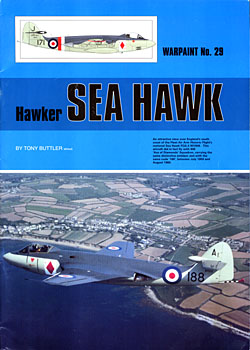 Hawker Sea Hawk Hawker Sea Hawk
Warpaint No 29
Tony Butler
Hall Park, ©2001
ISSN 1363-0369
40 Pages, Softbound The Fleet Air Arm was slow to embrace jet engine technology. While the RAF had the Meteor and Vampire in service, the FAA was just getting started with the Supermarine Attacker, and it wasn't until the Hawker Sea Hawk that the Navy received its first original-design jet fighter. The engine location in the Sea Hawk is what set it apart from other jets of its day, with its bifurcated intakes & exhausts providing the maximum amount of fuselage space for fuel and avionics. Other than the engine bits, the Sea Hawk was a very conventional design, which made it popular with other navies rebuilding after the Second World War. The Netherlands, India and Germany all flew the Sea Hawk for many years in addition to the FAA. The FAA Sea Hawks also saw action during the Suez Crisis in 1956, performing well in the air-to-ground role. This Warpaint title carries on the tradition of the style, with plenty of photos, lots of color profiles, and a very well written text. Everything you want to know about the Hawker Sea Hawk is in here, and while the majority of them were finished in the same colors, there are a few interesting surprises that will really look neat on your shelf. With a new-tool Sea Hawk kit coming out sometime this year, this book is very well timed. If you're a Fleet Air Arm fan, you'll definitely want to grab this book. My thanks to Hall Park for the review sample. Be sure to check out their website! | 


 



|